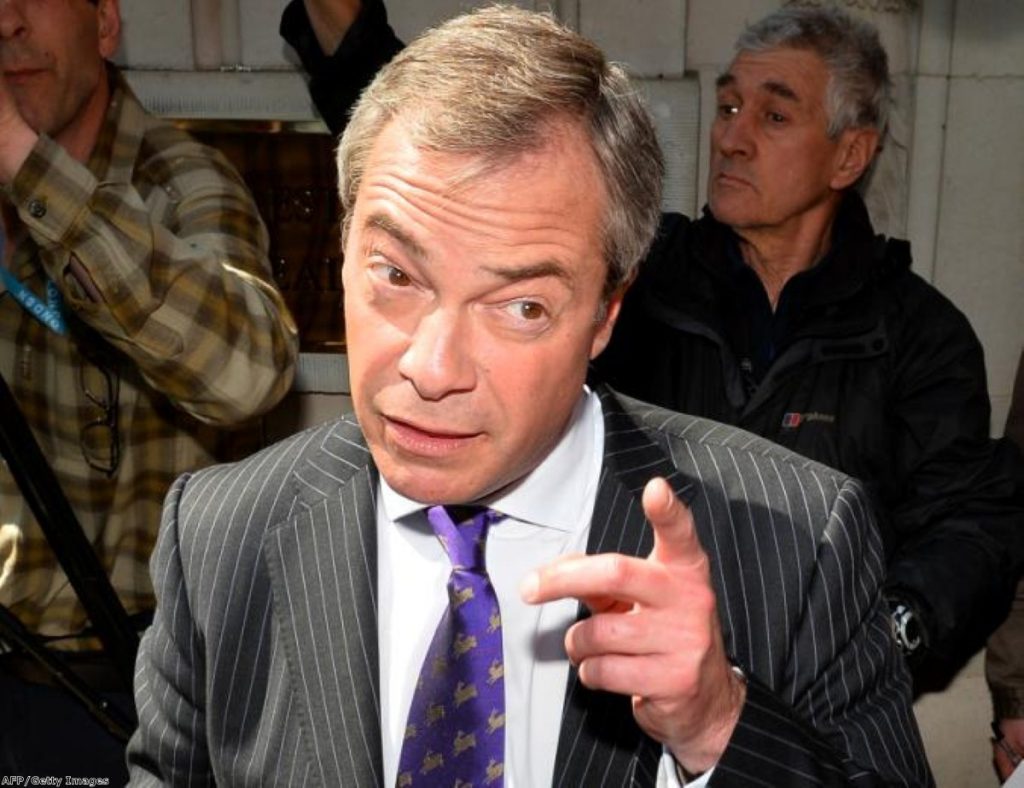Bring me the head of David Cameron: Farage names price of Tory-Ukip deal
Nigel Farage has David Cameron firmly in his sights after last week's dramatic election results, suggesting a Tory-Ukip deal could be possible if the prime minister stands down.
The Ukip leader opened up the possibility of an electoral pact with the Conservatives at the next general election in interviews this weekend.
An ally of Farage told the Sunday Mirror newspaper: "Nigel will do a deal with the devil if it works for the party and our supporters but he won't work with the Tories if Cameron is leader. He wants his head on a plate."
Farage himself told the Mail on Sunday newspaper: "There are lots of intelligent ways of doing deals in the future, all sorts of things a sensible, patriotic Conservative leader, could pursue.


"I have been approached by Conservative associations who say 'look Nigel, not only have you taken a lump of our vote but you've also picked up the council estate vote round the corner which is never going to come to us. If we ran a candidate on a joint ticket we would walk it'.
He added: "I have sat round the table on Sunday evenings with Conservative party officials who have suggested this kind of thing to me."
The move comes as grassroots Tories are confronted by the true extent of the threat from Ukip, which took 23% of the projected national vote – just two points less than the Conservative party.
Cameron himself has responded to the news by doing his best to withdraw his previous dismissal of Ukip as "fruitcakes, loonies and closet racists". He said people who voted for Ukip now deserved "respect".
"Cameron set the course of this coalition government," Farage told BBC1's The Andrew Marr Show. He said the Tory leader had pursued a pro-EU stance and rejected the idea the PM would change his approach in the coming years.
"Please don't think Ukip is just some little pressure group will just go away because somebody in Downing Street starts singing the same song," he said.
"If David Cameron gets removed, and I suppose given we've got a European election coming up before the next election that's not impossible, and somebody else was put in place who wanted to come and talk to us and say 'shall we find an accommodation?' we'd consider it."
Farage denied wanting to be prime minister himself. When pressed on the issue, he said: "My priority is I want to make sure my children can grow up in a country that they can call their own."
He confirmed his intention to stand for parliament in the 2015 general election, however.
Senior Conservatives have indicated more needs to be done to deal with the threat from Ukip ahead of 2014's European elections, which Farage has confidently predicted Ukip will win outright.
"The great majority of the people who supported Ukip are ordinary, decent people," defence secretary Philip Hammond told the same programme.
"Many of them are frustrated Conservatives. Frustrated at the length of time it's taking to get the economy going again, frustrated by the constraints of coalition government, frustrated about the way globalisation limits our ability to control the world which affects us so much. We understand these people's concerns and we are addressing the issues they care about.
"We've got to redouble our efforts to deliver on those things that matter to ordinary people and we've got to communicate that better. And we've got to remind them we're governing in a coalition."
Writing in the Sunday Telegraph newspaper, foreign secretary William Hague acknowledged that "these election results do matter" but denied a "drastic" change of course was needed in response.
He proposed reminding voters that the Tories do care about Ukip's big issues of immigration, the EU and benefits, "relay" what the government is doing about them more effectively and avoid "the trap of lowest common denominator politics".
Sticking firmly to policy headaches rather than addressing the leadership question, he wrote: "There is always a temptation for politicians to offer quick fixes; to say we can cut taxes, increase spending, bring down the deficit and solve our nation’s problems with a wave of a magic wand. When times are hard the temptation to do this is even stronger.
"People are tired of bad news. Many want to hear that there’s a Plan B or C or D that is a shortcut to success. But to offer shortcuts that will not work would be to cheat the British people, offering them a dead end – and frankly it is patronising them too."












